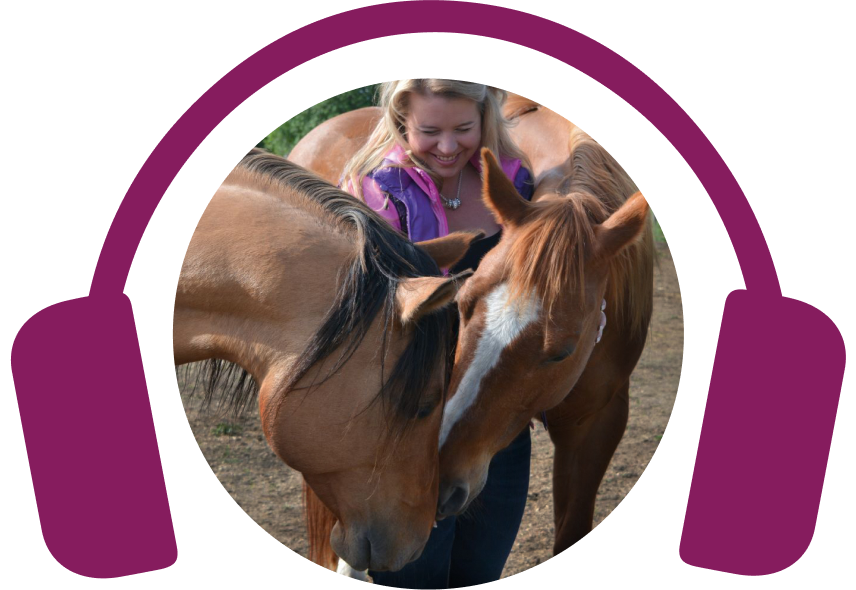Elisha’s Podcast
ELISHA’S PODCAST

Ready to get your horses on the path to better health?
This podcast was created to do just that.
Tune in to get new insights, perspectives, horse health tips, and real-life horse healing stories.
Take what you learn and apply it to your horse TODAY.

One Conversation at a time
From learning what to feed your horse and how to use nutrition effectively, to practicing prevention and approaching specific health challenges naturally, to just bringing your horse more joy and better health…
I’ve got you covered!

Check out my recent episodes
This week, we are focusing on dosing. In this episode, I explain the concept of the minimum effective dose, which is the smallest dosage required for the body to respond to or benefit from. The same principle applies to horses when adjusting their nutrition or adding supplements. The aim is to provide just enough to see a positive response, without going so far that it causes unwanted or harmful effects. Dosing Principles In pharmacology, the ideal dosing range lies between the minimum effective dose and the maximum tolerated dose. That principle also applies to nutritional supplementation in horses, where exceeding the minimum effective dose could lead to side effects or adverse reactions. The goal is always to use the smallest amount that elicits a benefit, minimizing waste and risk. Why Less Is More Once a supplement starts to work, increasing it will not necessarily improve the results. It will likely reduce the effectiveness and strain the body. So, always start with just enough to be effective. Individual Tolerance and Sensitivity Every horse responds differently to supplements. Factors like breed, health history, and immune strength all play a role. One horse may tolerate pasture or a supplement easily, while another may react badly to the same thing. Sensitivity varies widely, so dosing should be based on the individual horse rather than generalized standards. Understanding the Modern Horse Today, horses are often nutrient-deficient due to poor food quality, high toxicity levels, and chronic stress. Those factors increase sensitivity and reduce nutrient absorption, leading to horses with leaky gut, immune disorders, or genetic diseases that require a more individualized approach to their supplementation. Start Low Many people tend to overdo supplementation, thinking more is better. That mindset could be harmful for sensitive animals like horses. When starting with a low dosage, you allow room to adjust upward if necessary and can avoid overloading the body. High doses can cause intolerance and side effects that could be mistaken for a problem with the supplement itself. Special Considerations The form and bioavailability of nutrients are the keys to determining whether or not a horse can absorb and benefit from them. For horses with inflammation, metabolic issues, or digestive stress, gentle and minimal intervention is always better. By avoiding multivitamins and using single, targeted nutrients instead, horse owners can support more precise and effective recovery. Form Matters Nutrient forms differ in their bioavailability. For example, magnesium oxide is less bioavailable than magnesium citrate or magnesium glycinate. When absorption is poor, you may need higher doses to see results, which can push the dose closer to the maximum tolerated limit without any real benefit. Choosing well-absorbed, high-quality forms helps ensure the horse benefits without adding stress to the body. Watch for Absorption Issues Stress and chronic health conditions can impair nutrient absorption. Even the best supplement will not help if the horse cannot digest or utilize it. Bloodwork is helpful, but if levels do not improve with supplementation, the issue may be poor absorption rather than insufficient dosing. Over-Supplementing and Nutrient Competition Supplements with too many ingredients can cause nutrients to compete for absorption, reducing their effectiveness. For example, copper and zinc interfere with each other when given together. Complex formulas can overwhelm the body, adding to its load. In many cases, simplifying the diet is more effective than increasing supplementation. Reset and Rebuild In cases of toxicity or poor liver function, the best course may be to remove all supplements, leaving the horse on only hay and water. That helps the body reset, reduces inflammation, and reveals whether or not a supplement is causing harm. Recovery should always begin with the basics. Only add nutrients and supplements once the horse can handle them. Do you know what exactly is in your horse's supplements, and what they're actually doing for their health? Keeping your horse's diet and supplement program clean is one of the most beneficial things you can do for them. There is nothing that turns a horse's health around faster than cleaning up their diet and supporting their health from the inside out. The good news is I'm going live on Saturday, December 6, 2025, at 10 am Mountain Standard Time, and I invite you to join me for my first-ever two-hour workshop called Detox Done Right: How To Reduce Your Horse's Toxic Load and Upgrade Their Health. For just $127 Canadian, you will get my hands on my label-reading playbook and my clean feed roadmap- and we will finish with a 30-minute Q&A to help turn your supplement confusion into clarity. If you care about your horse's health and want real, practical steps that lead to results, then this workshop is just for you! Save your seat by clicking on the link in the show notes, or head over to my website. No need to worry if you register and miss it because I will have a recording waiting for you, whenever you are ready- but I do hope to see you all there, live! Links and resources: Connect with Elisha Edwards on her website Join my email list to be notified about new podcast releases and upcoming webinars. Free Webinar Masterclass: Four Steps to Solving Equine Metabolic Syndrome Naturally Register for my self-paced course, Resolving Equine Metabolic Syndrome Naturally. We are exploring glucosamine today. About a decade ago, glucosamine was marketed and sold as a joint supplement for horses. It is still available for joint support in dogs and humans, but seldom as a supplement for horses. In this episode, I discuss my experience with glucosamine, sharing its origin and clarifying some of the holistic principles it breaks. Nutrients vs. Nutraceuticals Nutrients are the vitamins, minerals, and essential fatty acids that are essential for life and must come from food. Glucosamine is a nutraceutical, a non-essential compound found naturally in cartilage that can help manage joint inflammation. It is not a dietary requirement, and it does not address deficiencies. Doubt Around Glucosamine Glucosamine was once widely used in equine joint supplements, often combined with MSM or chondroitin. However, many horse owners and practitioners saw no real benefits. Its popularity was due to marketing and general concerns about joint health and mobility in horses. Inflammation Supplements alone cannot cure joint inflammation. Often, underlying factors (stress, poor diet, and excessive sugar) play a role. If those issues go unaddressed, even the best supplements will be inneffective. Insulin-Resistant Horses Glucosamine is an amino sugar that contains a glucose molecule, which raises red flags for insulin-resistant horses or those with a sluggish, congested liver. Those horses are already prone to inflammation and joint pain, and adding glucosamine may further burden their liver’s ability to metabolize. Long-Term Supplementation Long-term use of glucosamine without addressing nutrient deficiencies may do more harm than good. The liver metabolizes everything that enters the body, so long-term supplementation could overburden it, especially if the supplement is unnecessary or of low quality. Source Matters Most glucosamine gets sourced from shellfish, which violates holistic principles for horses, as they are strict herbivores. Using animal-based ingredients for horses is not considered species-appropriate and should always be avoided unless the supplement is truly effective. Glucosamine Forms and Sulfur Sensitivity Glucosamine comes in different forms- either glucosamine sulfate or glucosamine HCl. As the sulfate version can cause sensitivities, like hives or respiratory issues, glucosamine HCl may be a safer option for horses with sulfur sensitivity. Evaluating Supplement Effectiveness To assess whether a supplement is truly helping, always consider whether mobility is improving and inflammation is decreasing. If you cannot see or measure any benefit, reconsider its use. Addressing nutrient deficiencies will likely lead to more effective and lasting results. Study Limitations Scientific studies on glucosamine are inconclusive and often based on other species (like rats, mice, or humans), so they may not reflect the realities of insulin-resistant or metabolically compromised horses. Ultimately, the individual history and response of the horse should guide your decisions. Final Considerations Although glucosamine is not inherently harmful, its long-term use should be questioned, especially for horses with insulin resistance. Glucosamine is not an essential nutrient, and it may place unnecessary strain on the body. Always prioritize foundational nutrition before turning to nutraceuticals. Links and resources: Connect with Elisha Edwards on her website Join my email list to be notified about new podcast releases and upcoming webinars. Free Webinar Masterclass: Four Steps to Solving Equine Metabolic Syndrome Naturally Register for my self-paced course, Resolving Equine Metabolic Syndrome Naturally. Today, we cover three foods to avoid for better horse health. This topic ties into our last discussion, where we explored toxicity in horses and how accumulated toxins can build up over time and lead to serious health issues. Sources of Toxicity in Horses Horses get exposed to various sources of toxicity, mainly through chemicals and preservatives in their food and water, medications, vaccinations, and deworming agents. Over time, the toxins build up and can overwhelm the immune system, leading to chronic health issues like inflammation, allergies, and sensitivities. Addressing the diet and removing toxic elements is often the first step toward recovery when horses are unwell. Corn Corn has high-calorie content and energy density, making it a common ingredient in horse feed. However, corn lowers digestive pH, leading to leaky gut and immune issues. It is also high in starch, which can overwhelm the small intestine if fed in excess, as the undigested starch can reach the hindgut, where it ferments, potentially causing acidosis, colic, or laminitis. Its low fiber content and imbalance of protein and amino acids make it less suitable as a standalone feed. There is also a risk of mold contamination when corn is improperly stored. While corn can be an energy boost for horses with high caloric needs, it is best to use it sparingly. Wheat Middlings Wheat middlings, a byproduct of milling wheat for flour, are often used as a source of fiber and protein in horse feed. They can be high in phosphorus and low in calcium, creating an imbalance that can affect bone health in horses if consumed in excess. Wheat middlings can also ferment in the hindgut, leading to digestive upsets like colic or laminitis. High levels of non-structural carbohydrates in wheat middlings can also be problematic for horses prone to metabolic issues like insulin resistance or equine metabolic syndrome. While middlings can be part of a balanced diet, feed them in moderation and combine them with other sources of fiber and essential nutrients. Processed Oils Canola, soybean, corn, or hydrogenated oils are not ideal for horses as they undergo high-temperature processing that generates free radicals, harming the immune system and leading to various diseases. Soybean oil can also create hormonal imbalances due to its phytoestrogen content. It is essential to choose cold-pressed, high-quality oils and only add them to the diet when necessary. High-Fat Diets High-fat diets can provide energy for horses doing heavy work or needing to gain weight, as fats are calorie-dense and provide slow-burning energy without the risks associated with high-starch feeds. However, horses lack a gallbladder and are biologically unsuited to process large quantities of oils. So, high-fat diets can cause digestive issues, malnutrition, and liver strain, slowing gut motility and worsening conditions like colic or ulcers. Balancing Nutrition While some challenging cases, like underweight or elderly horses, may require short-term use of problematic foods or oils, the goal should always be to provide high-quality, minimally processed nutrition in the long term. Horses thrive on a natural diet that aligns with their biology. For optimum health and resilience in your horse, pay attention to sensitivities and make adjustments where necessary. Final Thoughts Avoid ingredients like corn, wheat middlings, and processed oils. Focus on natural, high-quality feeds, and tailor the feeding strategy to fit the specific dietary requirements of your horse and support its long-term health and vitality. Links and resources: Connect with Elisha Edwards on her website Join my email list to be notified about new podcast releases and upcoming webinars. Free Webinar Masterclass: Four Steps to Solving Equine Metabolic Syndrome Naturally Register for Resolving Equine Metabolic Syndrome Naturally, now.
Meet your host
Hi there, I’m Elisha Edwards

Meet your host
Hi there, I’m Elisha Edwards
I have helped guide thousands of horses back to good health over the years from a variety of different health challenges. And through my courses, webinars, and speaking engagements I educate and empower horse owner’s from around the world to take charge of their horse’s health using the holistic model of health care.
So I know first-hand how difficult and overwhelming it can be to navigate all the different opinions and conflicting information that you come across especially when your horse is faced with a health problem. In many cases, the journey is just as hard on the owners as it is on the horses.
I started Healing Horses with Elisha to guide you, support you, and encourage you through the process of prevention and recovery so you feel good about the decisions you’re making for them.
Here’s what I believe
I have seen countless horses with seemingly impossible health conditions that have been resolved so easily with the right combination of diet, nutrition, and natural remedies. In many cases, it is not the health conditions that prevents the horse from recovering, it is the lack of education, resources, and options that are available.
If the insight and information you gain from this podcast gives you some newfound hope or inspires you to take
a new approach then it has served it’s purpose.
Thank you for giving me the opportunity to help you improve your horse’s health.
Keep listening and learning. Your horse is worth it.
Listen Now
Tune in wherever you listen to your podcasts and follow me so you never miss an episode. I release a new one every Tuesday!

Leave a Review
Reviews help me reach more horses and also help me deliver more relevant content to you!

What my Listeners are saying
“Every time I think there is no way to top what you do – you elevate us to yet another level. I wish I had a fraction of your communication skills. You’re amazing and I am so grateful to be apart of the magic you are creating for horses and their humans.”
Tracey
“Your podcasts are fantastic! I get so excited to listen to the next one. I have 6 geriatric horses and your podcast has really opened my mind to new possibilities in their health and given me the strength to help them through hiccups in their well-being the past few months. I have a nursing education and you explain pathology better than my university professors.”
Sharon
“I can’t thank you enough for the Mindset Tips podcast. I really needed this reminder. It was just what I needed to hear to today.”



